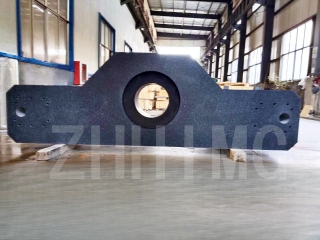Granite components have been widely used in the semiconductor manufacturing process due to their advantages over other materials. These advantages include their high thermal stability, excellent stiffness and dimensional stability, superior wear resistance, and excellent chemical resistance. In this article, we will examine these advantages in more detail and explain why granite components are an ideal choice for semiconductor manufacturing.
High Thermal Stability
Granite has excellent thermal stability, which is essential in the semiconductor manufacturing process. The high temperatures used in the process can cause significant damage to the equipment, causing costly downtime and repairs. Granite's ability to withstand high temperatures makes it an excellent choice for many applications in the semiconductor industry.
Because of its low thermal expansion coefficient, granite is also suitable for use in the metrology equipment that measures temperature changes during the manufacturing process. The thermal stability of granite components ensures that the measurement equipment will remain accurate throughout the manufacturing process.
Excellent Stiffness and Dimensional Stability
Granite exhibits superior stiffness and dimensional stability compared to other materials. These two properties are essential when it comes to the precision machining required in the semiconductor manufacturing process. Any deviation or distortion in the equipment can cause defects in the product, which can be costly to correct.
Granite's stiffness also allows for better damping properties, reducing vibrations that can affect the precision machining. This is crucial in the semiconductor industry, where even tiny variations in the equipment can cause substantial problems in the final product.
Superior Wear Resistance
Another advantage of granite components is their superior wear resistance. The semiconductor manufacturing process is highly abrasive, and the equipment used in the process has to withstand continuous contact with abrasive materials. Granite's hardness ensures that it can withstand this abrasion without degrading or needing frequent replacement, reducing maintenance costs and downtime.
Excellent Chemical Resistance
The semiconductor manufacturing process involves the use of various chemicals, some of which can be highly corrosive. Granite exhibits excellent chemical resistance and can withstand exposure to a wide variety of chemicals without experiencing damage or degradation.
Granite components are ideal for use in the etch chambers that use harsh chemicals to remove materials from the silicon wafers. The components' chemical resistance minimizes the risk of contamination in the manufacturing process, improving product quality and reducing costs.
Conclusion
In conclusion, the advantages of granite components for semiconductor manufacturing are significant. Their high thermal stability, excellent stiffness and dimensional stability, superior wear resistance, and excellent chemical resistance make them an ideal choice for equipment used in the semiconductor industry. Choosing granite components can significantly reduce maintenance costs, improve product quality, and reduce downtime, making it a cost-effective solution for semiconductor manufacturing.
Post time: Dec-05-2023

